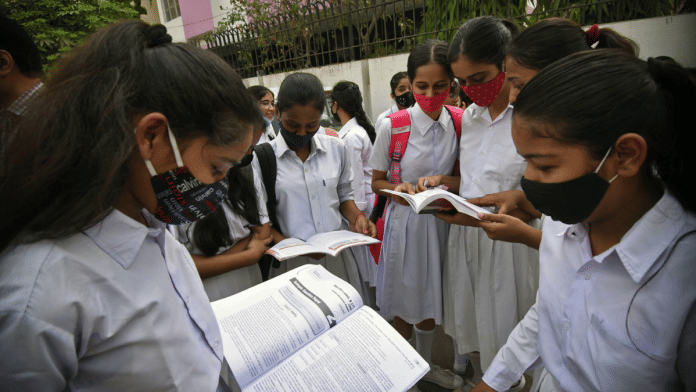New Delhi: The Central Board of Secondary Education (CBSE) Wednesday released its final policy for conducting two board exams for Class 10 students in the academic year starting 2026, making the first exam mandatory and the second optional.
The Board had released a draft of this policy in February and sought suggestions and feedback from stakeholders. According to CBSE Controller of Examinations Sanyam Bhardwaj, the majority of the feedback supported conducting exams twice, with 65% of students in favour.
“However, teachers and principals suggested making the first exam mandatory to ensure students take it seriously.That’s one change we have incorporated in the final policy,” Bhardwaj told the media.
The two-board exam system aligns with the 2023 National Curriculum Framework, updated to reflect the National Education Policy (NEP), 2020, which aims to reduce the high-stakes nature of board exams by allowing students two attempts per year—one main exam and one optional improvement exam. The exams will be held in February and May.
To ensure that students take the first board exam seriously, which will serve as the main examination, the CBSE has decided that students who are absent in three or more subjects during the first exam will not be eligible to appear for the second (optional) exam.
According to the final policy, such students will be placed in the ‘Essential Repeat’ category and will only be allowed to reappear in the main exams the following year, in February.
However, exceptions will be made for certain cases. Sportspersons will be allowed to appear in the second exam for subjects whose exams coincided with their sporting events. Additionally, students from winter-bound schools in regions like Ladakh may choose to appear in either the first or second exam for the subjects offered.
Second board option in up to 3 subjects
The CBSE has also limited the number of subjects a student can appear for in the second board exam to three. This means Class 10 students may take a second attempt in any three subjects from Science, Mathematics, Social Science, and languages.
This decision, which was not part of the draft policy, was made based on stakeholder feedback.
“It aims to ensure that students take the first board exam seriously and only reappear for subjects in which they genuinely wish to improve. We just don’t want the second board option to become an opportunity for shopping,” said CBSE chairperson Rahul Singh.
Meanwhile, both exams will be based on the full syllabus for the academic year. The scheme of studies and the exam structure will remain unchanged.
Students who receive a Compartment result in the first exam will be allowed to appear in the second leg under the Compartment category. Additionally, students from the previous year’s First or Third Chance Compartment and Improvement categories will also be eligible to take the second exam.
Currently, CBSE conducts Compartment and Improvement exams in July. Under the new system, these will be held in May, allowing students to join the next academic session on time.
How will the results be declared?
According to the Board, the results of the first leg will be announced in April, while the results of the second exam will be declared in June. The performance in the main exam will be made available on DigiLocker, which can be used for admission to Class XI if the student opts not to appear for the second exam for improvement. Pass certificates will be issued to all students after the results of the second exam.
Facilities for verification, and re-evaluation will be available only after the declaration of results for the second exam, applicable to both the main and second exams.
Students who do not qualify in the main exam will be granted provisional admission to Class 11th. “Their admission will be confirmed based on the results of the second exam,” the Board stated.
(Edited by Tony Rai)
Also Read: CBSE’s mother tongue circular has stumped school principals. Everyone’s interpreting it differently






